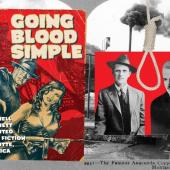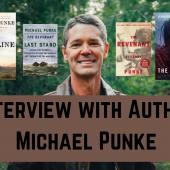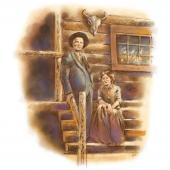Our Interview with C.J. Box

C.J. Box author photo
No roundup of Western mysteries would be complete without the award-winning success of Wyoming native C.J. Box, New York Times bestselling author whose work includes the Joe Pickett series and the Cody Hoyt/Cassie Dewell series. C.J. Box published the 21st novel in his Joe Pickett series in March 2020; it remained the #2 New York Times bestselling novel for two weeks. He is the recipient of multiple literary awards including the 2016 Western Heritage Award for Literature. His Cody Hoyt/Cassie Dewell series (The Highway, Badlands, Paradise Valley, and The Bitterroots) serves as the foundation for the ABC show Big Sky, for which Box is an executive producer.
In a world of stories romanticizing and caricaturing the American West, C.J. Box’s novels are a welcome dose of honesty in their dedication to portraying the modern reality of the West and its people. Beginning with the first Joe Pickett novel Open Season (2001), Box has given readers captivating mysteries set amongst the mountains, plains, and small rural towns. From adventure-prone Wyoming game warden Joe Pickett to detective Cassie Dewell, Box’s novels are bursting with colorful characters as real as anyone you might find next to you on a barstool in Winifred, MT.
Not only are C.J. Box’s stories refreshingly real, they are also damn entertaining, balancing human drama with commentary (but not, as he is careful to point out, propagandizing) on life in the modern West. Those of us who live in these places are keenly aware of larger issues facing Western communities, from hunting rights to oil drilling, land use to water rights; these integral parts of Western life are woven seamlessly into Box’s work.
C.J. Box recently took the time to say more about the inspiration for his work, his experience with the Big Sky TV show, and his thoughts on the future of Western literature:

Big Sky promotional image
Distinctly Montana: One thing I appreciate about your work is your dedication to creating characters who represent the real, varied people living in the West. When I read your books I recognize people I’ve known growing up in Montana, which means a lot to me as a reader. What can you tell us about your process of creating these rich casts of characters, and is there anything you do to avoid falling into stereotypes?
CJ Box: Thank you. I grew up reading every book I could set in the Mountain West, specifically Montana and Wyoming settings. Although often beautifully written, I found many of those books to have an outsider’s point of view. (There are plenty of books written today that have the same problem.) In those books, many of the characters were (and are) stereotypes: rubes, cowboys, faux-noble American Indians, and on and on. They didn’t reflect the people I saw around me, many of whom are well-educated and sophisticated if independent and quirky types. I always thought that if I were lucky enough to get a novel published, the characters would be as authentic as I could make them.
DM: Do you have a favorite character you’ve written, and, if so, why? Conversely, is there a character you would least like to meet in real life?
CJB: That’s a hard question. I enjoyed writing about Jess, the aging rancher in Blue Heaven, as well as creating the character of Cassie Dewell and writing from her point of view. But I’d have to say my favorite is likely Joe Pickett. I’ve now completed twenty-one novels with him as the protagonist, and he’s such a comfortable presence that I never grow weary of him as he (and I) get older. The fictional character I’d least like to meet is Ronald Pergram, also known as The Lizard King in The Highway and several follow-up books. I really had to go to some dark places to write from his perspective.
DM: I imagine many of us don’t typically associate the mystery genre with the wilderness of Wyoming and Montana. What inspired you to write mysteries?
CJB: I never really thought of the books as being in a specific genre. To me, mysteries were written by Agatha Christie. I still think of each book as a contemporary Western novel that may or may not be a true mystery book. Some are more police procedurals, some are more thrillers. This is not to say I don’t like having the novels classified as mysteries, because mysteries are the most popular books there are.

Dark Sky by C.J. Box
DM: Do you have any favorite mystery or Western (or Western mystery) writers who particularly inspire you?
CJB: I’m a big fan of so many authors that I will likely forget to name a few here. But here is a partial list: Thomas McGuane, Pete Dexter, Cormac McCarthy, Flannery O’Connor, Elmore Leonard, Joseph Heller, Steven Ambrose, Raymond Chandler, Adrian McKinty, Tom Wolfe, James Lee Burke, Harper Lee, Ivan Doig, Patrick O’Brian, Thomas Berger, Farley Mowat, Wallace Stegner, Edmund Morris, John Sandford, Denise Mina, Michael Connelly, A.B. Guthrie, Megan Abbott, Daniel Woodrell, George Saunders, Jim Harrison.
DM: How has it been to see your work adapted for television? To what extent have you been involved in the process?
CJB: It’s a little other-worldly to see the books adapted for television. I like to joke that I’m involved in two aspects: I provided the source material and I cash the checks. I’ve had plenty of conversations with the show-runners for both Big Sky (ABC) and Joe Pickett (Paramount/Spectrum Originals), but I’m not involved in the day-to-day productions and I really don’t want to be. Shooting a multi-episode television series involving hundreds of people is a wholly different animal than sitting alone in my office writing a novel. The most important thing to have happened as a result of the two television productions is that a lot of new readers are coming on board. Book sales have skyrocketed.
DM: Many of your books deal with real, large issues facing Wyoming, Montana, and North Dakota (such as the Endangered Species Act or the Bakken oil industry). Are there any current issues you’d like to address in your work going forward?
CJB: I think it’s important (and accurate) to include contemporary issues and controversies in the novels, and I’m always on the lookout for things that interest me and things people are talking about. We’re on the cutting edge of so many big issues in the Mountain West when it comes to energy development, land use, wildlife and resource controversies, and so many other things. I want the novels to reflect that. Although each novel involves crimes and solving mysteries, they are also about what’s going on around us. I try not to preach or propagandize on issues. I don’t like it when writers do that. I’d rather present both sides in an honest way and trust the reader to come up with their own conclusions.

Joe Pickett premieres on Spectrum on December 6, 2021
DM: As those of us who live here know, the West is changing in many ways. What are your thoughts on the future of Western literature in a changing, modernizing human and environmental landscape?
CJB: One thing I see happening (albeit very, very slowly) is that novels set in the West are no longer being pigeon-holed into the category of “regional literature” and therefore automatically dismissed. There are simply too many excellent authors out there producing excellent books (see the list above for many of them) to not recognize that some of the best novels around are coming from Western-based folks.
DM: Any future plans for your work that you can tell us about? Can we expect to see more of Joe Pickett?
CJB: There will be a new Joe Pickett novel called Shadows Reel in March. It takes place the day after Dark Sky concluded. It’s a wild one. I’m working now on a new Cassie Dewell book tentatively titled Treasure State that will be out late next summer. It’s a fun job.

Author photo of C.J. Box. Photo by Dave Neligh.












- Reply
Permalink